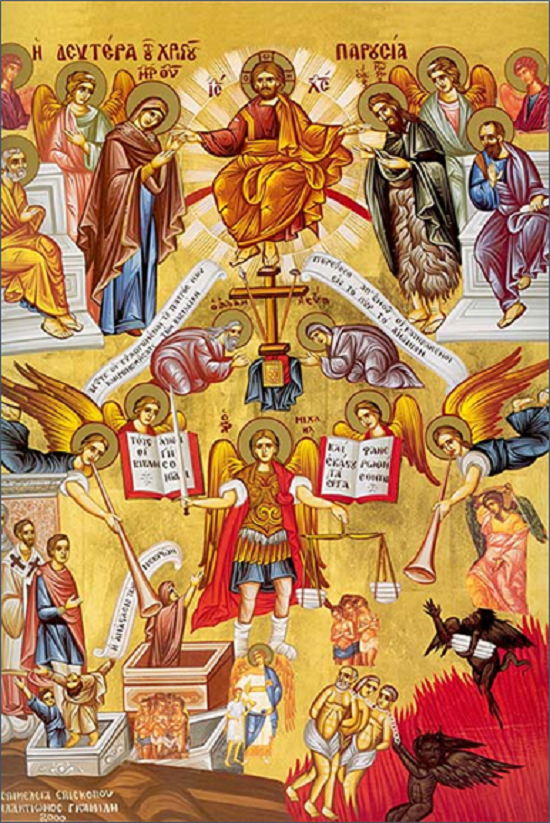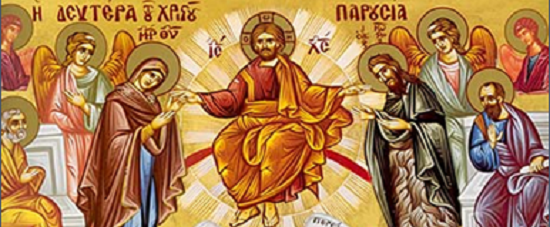The Future Is Now
First Sunday of Advent Scripture Readings

Be vigilant because the Lord of the house is coming. Could the message of today’s brief gospel passage be any clearer? But wait…not so fast. Let’s take a step back and look at the bigger picture. Today marks a new beginning. It’s the start of a new liturgical cycle, running from our anticipation of the emergence of our God into our human condition, reaching its apex in our transformation through the death and resurrection of Jesus and the indwelling of the Holy Spirit, and carrying on for the rest of the year, providing us with the support and guidance of the words and deeds of our Savior. We call it our liturgical year.
The last time we followed this cycle, which ended last weekend, we experienced it through the eyes of the Apostle and Evangelist, Saint Matthew. Now, starting today, our focus shifts as we hear the story told this time through the words of Saint Mark the Evangelist. It’s a slightly different perspective. Mark’s gospel is both the earliest and the briefest of the gospels. Because it’s closest in time to the events it describes, it’s also the simplest. It’s unencumbered by much of the perspectives and reflections from the early Christian Community, the Church.
We’re starting our liturgical journey through Mark’s gospel at an interesting place. Today’s gospel passage comes from the very end of the thirteenth chapter. The very next verse begins chapter fourteen, and the narration of Christ’s passion and death. The whole of chapter thirteen describes the end of the world as the first disciples were to experience it, commencing with the destruction of the Holy City of Jerusalem and its temple. For them, it must have seemed like the end of the world. The chapter continues, describing the coming of the Son of Man as described in the Book of the Prophet Daniel. This whole chapter is presented to us as Jesus’s answer to his disciples’ question about when these trials and tribulations will happen, and how they will know it. As a result, today’s gospel passage sums up Jesus’s message, saying, “Watch for it.”
This seems like an odd place to begin our reflections on the coming of our Messiah-king—our Advent. After all, here we are at the beginning of our liturgical cycle, and yet we’re being asked to reflect on the end of the world? It’s very easy for us to forget how God messes with time. At first, it might seem that, as we take our annual trip around the sun, we’re simply ending one iteration and beginning the next one in a never-ending loop of birth, growth, death, rest and renewal, and repeat. Or it might appear to us that we’re on a continuing path from creation to Parousia, at which time we’ll be called on to make an accounting of ourselves and our stewardship…so be ready. But are either of these the perspective that God wants us to take on our spiritual life journey? Is it possible that our personal history and the history of mankind might be something else entirely? Could creation and the end of the world be happening all around us all of the time?
To make sense of salvation history, we need to move beyond the simplistic viewpoint that sees the creation of the universe, the Incarnation, death, and resurrection of Christ, and the end of the world as unique moments in time. In fact, they don’t happen in profane time, at all. They all belong to what we call Sacred Time. Sacred Time exists separately and apart from the events that occur within it. It has no beginning, no ending, and no duration. There’s no before or after. It just is. In the same way that we can imagine evolution as ongoing creation, so also the history of salvation is simply God’s saving Presence as observed from our point of view immersed as we are in profane time. In Sacred Time, creation, Incarnation, salvation, and Parousia are all one, ever-unfolding event.
Beginnings and endings are irrelevant in Sacred Time. That’s why the Advent season is so important. It reminds us to consider time from God’s point of view. In Sacred Time, saying “Christ has already come,” and saying, “Christ is yet to come” are equally meaningless statements. Christ just is. We can now look at today’s gospel from this perspective. We are the servants who have been placed in charge of everything. Each of us has our own strengths and each of us has our own work to accomplish. Because the Lord of the house comes at night when things seem peaceful and quiet, we’re liable to be lulled into a false sense of security. But the coming of the Savior with both challenges and opportunities takes no rest.
That’s why there’s no taking a vacation from our spiritual lives. We’re either growing or diminishing, progressing or regressing, and the Parousia is on us. It comes with the question, “How’re you doing?” It asks, “How’re you doing meeting today’s challenges?” It wants to know, “How’re you doing responding to today’s opportunities?” Don’t look to the Christ who came in the past. Don’t look for the Christ who will come in the future. Christ, the Lord of the household comes now. The time of judgment, the time of salvation, is now. “May he not come and find you sleeping. What I say to you, I say to all: ‘Watch!’”
Get articles from H. Les Brown delivered to your email inbox.
